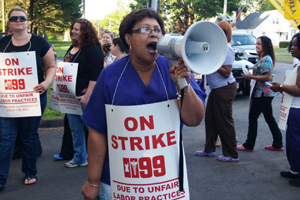Service Employees 1199 New England is striking five Connecticut nursing homes to defend contracts against sweeping concessions.
About 700 members walked out July 3 after HealthBridge Management, which had already prompted a three-month lockout at one of the nursing homes last winter, imposed a contract that attacked everything from pension funds to employees’ rights to organize.
The company’s position has barely changed since negotiations began in March 2011, according to SEIU 1199NE spokeswoman Deborah Chernoff.
“Pretty much every right and benefit and economic gain people have struggled for over the last 30 years, they’ve eliminated,” Chernoff said, adding that the imposed deal altered 38 of the 39 articles of the previous contract.
Those alterations include eliminating staffing ratios, requiring workers to pay health insurance premiums for the first time, cutting sick days by half, preventing delegates from hearing grievances during work hours, and switching from an employer-funded pension to a 401k.
HealthBridge said the workers' contract was “realistic in the current health care environment.”
Chernoff said the company told “us directly in negotiations that their goal is to have union and non-union workers working under the same conditions.”
“They want to take back everything,” said striker Barbara McFadden, who has worked as a certified nursing assistant for 10 years at the West River Health Care Center in Milford,
Connecticut. “We had no choice; they made us go on strike.”
NLRB Levels 5th Complaint
The National Labor Relations Board issued a complaint against HealthBridge on July 6, saying the company has committed unfair labor practices, having “failed and refused to bargain in good faith."
HealthBridge hired scabs and threatened to permanently replace strikers. Now that it is facing active unfair labor practice complaints, it cannot legally hire permanent replacements.
The NLRB ordered the company both to pull its imposed contract and to reimburse its employees for the wages and benefits lost due to its implementation.
The Labor Board set a trial date of September 10, and Chernoff said it was likely the strike could last at least until then.
Chernoff said if the owners “choose to ignore the law and exploit the length and intricacies of the appeals process, we are expecting and preparing for this to be a very long struggle.”
Because members were willing to work without a contract, they will be eligible for unemployment under Connecticut law. The union organized sessions to explain requirements.
The latest complaint is the fifth the NLRB has issued against HealthBridge.
The fourth was issued after the company locked out the workers at West River between December and April in an attempt to coerce them into accepting its proposal. In addition, the NLRB had to order CareOne, a sister company of HealthBridge, to bargain in good faith after a New Jersey nursing home voted for SEIU 1199 representation. The company had fired or disciplined 10 union supporters and refused to bargain.
Patient Support
Patients and their family members have voiced support for the Connecticut workers, saying they are an important, supportive presence in residents’ lives. They worry that the scabs replacing them are not as invested.
“I am concerned about the discontinuity in my father's care,” wrote Peter Piazza, whose father is at West River, in letter to the editor of the CT Post. “I am disappointed that workers were left with no other options.”
Striking workers also received support from Connecticut Governor Dan Malloy, who joined the workers on the picket line and released a statement accusing HealthBridge of “unacceptable” tactics.
Malloy pointed out that SEIU 1199 has settled contracts with dozens of other Connecticut nursing homes during the 15 months it has been negotiating with HealthBridge.
“In this economic climate there’s more of an appetite,” Chernoff said, “to think that people are so terrified about losing their jobs that they’ll accept anything.”
But SEIU 1199 prepared members to stand strong. More than 100 members have attended negotiations, where they saw firsthand what the company was trying to impose.
“This is a group with long average service—more than 12 years—because over time we have been able to turn these into decent jobs,” Chernoff said. “So many remember what it was like pre-union and they don’t want to go back.”
Law-Breakers
Meanwhile, workers are learning that they can’t trust the company to obey the law on the picket line, either.
McFadden, who is a strike captain at the West River picket, said that the workers were having lots of trouble with the new security hired for the strike.
“They are ruthless,” she said.
According to McFadden, workers have the right to picket for a minute and a half while scabs drive onto the facility. But the security guards will not let them do even that, and are pushing picketers into the street.
Now strikers are recording the actions of the security guards and using the footage to argue for their rights.
“They’re not going to intimidate us,” she said.
Olivia Rosane is a member of United Auto Workers Local 2179 in New York.
/>







